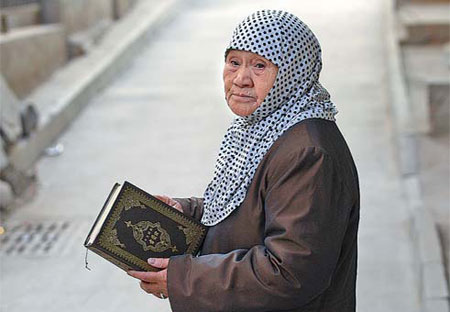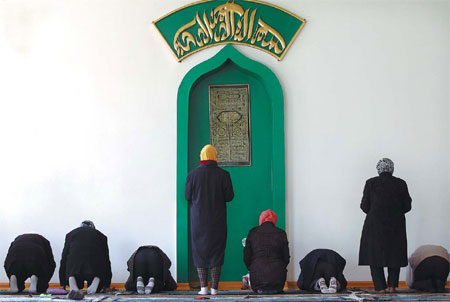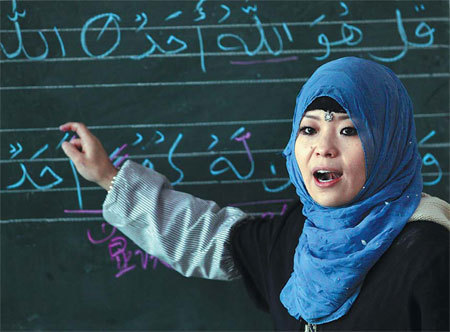Mosques give women a major say
Updated: 2012-11-20 08:03
By Cui Jia (China Daily)
|
||||||||
Relocation
The Lulan mosque was reconstructed on the original site in 1998, but now faces relocation. The two-story building, topped with the traditional crescent, is one of the very few old buildings still standing in the area. Many of the old blocks have been torn down to make way for modern apartments and office blocks.
While the Quran was being chanted upstairs, against the background noise from a nearby construction site, Ma Lan, the caretaker, began to clean the small bathroom downstairs, where worshippers perform the pre-prayer ritual of washing their faces, hands and feet. Had she not been menstruating, Ma Lan would have been upstairs with the three females worshippers.
 |
|
Ma Guifang, 80, has been to the Lulan women's mosque in Lanzhou every day for the past two decades. |
Serving in a women's mosque was a long-term ambition for the 46-year-old. She quit her job in nearby Ningxia and moved to Lanzhou, home to 1.66 million Muslims, in 2006. During the winter, she rises at 4 am to shovel coal into the boiler to ensure a good supply of hot water for the washing ritual. "Women do all the work here, no matter how physical it gets," she said.
After prayers, Ma Guifang came down the stairs to ask Ma Lan if the large pile of coal stored in the middle of courtyard would be enough to last the entire winter. If not, she would like to make another donation. The mosque is financed solely by donations from female worshippers and visitors.
"We receive about 2,000 to 3,000 yuan ($321 to $481) a month," said Tao Jinling, the imam, pointing at the list of donors and how much they gave. "Around 20 to 30 people come to the mosque every day. The number rises to around 150 during the Juma prayers on Friday."
Most of the women who worship at Lulan are aged around 60, but some are 90. "Young people can't come because they have jobs and middle-aged women have to stay at home and take care of their families," Tao explained.
Although Ma Ashe had known about Lulan for a long time, she only began to visit this year. "Both of my children started work this year, so I have time to come to the mosque. The children are very supportive," said the 46-year-old housewife. "They are too busy working to perform all five prayers every day, let alone attend the mosque."
Tao first came to Lulan as a student in 1991. Four years later, she graduated and became an imam. In addition to her role as the mosque's spiritual leader, the 40-year-old is also the accountant and is responsible for all the donations.
Community center
Tao believes the women's mosque is a symbol of development. "It also acts as a community center for female Muslims, a place where they can talk about their problems. I hope more people will support women's mosques and I think more should be built," she said, while taking off her imam's gown after prayers.
 |
|
Inside the prayer hall of the Lulan women's mosque. |
"Muslims care about education for women because we believe they are the lighthouse of the family. Their influence helps to keep our society stable," said Wang Yuming, director of Lanzhou's Xihu mosque, which also runs a school for women.
The school is located at the side of the prayer hall for men. It has more than 200 students, the classes are free and anyone is welcome, as long as they are aged 16 or older. Many of the students have reached retirement age.
The school has no such thing as graduation, because students are allowed to stay as long as they want. Deng Xiulan, 72, has been a student since 2005 when the former Arabic learning center was converted into a school for women. "There are always new things to learn. Coming to the school has become a part of my life," she said.
The school costs the mosque about 500,000 yuan every year, but Wang believes it's worth every penny. "In addition to teaching the women about the Quran and Islam, we also teach them basic math and urge them to tell their children to stay away from drugs," he said. "Female Muslims deserve a decent level of education and the mosque is the best place to provide that.
"Now that winter has come, we have to make sure the classrooms are warm enough to allow elderly students with arthritis to sit through the classes without pain," said Wang, as he conducted his daily round of the school at 8:30 am as classes began.
There are nine classes in the school. Every classroom is decorated with flowers and some have posters of Al-Azhar University in Egypt - the chief center of Arabic literature and Islamic learning - hanging on the walls. The school has about 100 students.
"We have nine teachers. They teach the seniors the Quran. The juniors begin by learning Arabic characters," said Zhang Chunxiu, the principal.
 |
|
Tang Li, 30, teaches Quranic chanting at the school for women at Xihu mosque in Lanzhou. |
A lifelong activity
For Muslims, learning is a lifelong activity, said Ma Lanying, 76, who has studied at the school for five years. She is now in the senior class. "I feel so proud that I can understand the Quran and know exactly what the prayers mean," said Ma, who walks 45 minutes to school every weekday.
An Hongmei is Ma's teacher. Before each class, she likes to discuss global current affairs, such as recent events in Syria and Egypt. "I want my students to know how precious peace is," she explained.
She believes that the more the economy develops, the more people will pay attention to education and the school's growth is an example of that.
But it's a huge challenge to teach a group of retired women a new language, said An. "There are no shortcuts, the students have to patiently repeat words or sentences time after time, but their determination is very impressive. I wish young people could see this."
In addition, the mothers can teach their children at home, so knowledge of Islam can be passed on to the younger generation, she added.
Ma Aizheng, who worked as a nurse before she retired, said she makes time to study at home in the afternoon after classes finish at 11:30 am. "Studying the Quran has become a spiritual support for me. I didn't have time when I was working and now I have a lot catching up to do," said Ma, who has introduced some of her friends to the school.
The teachers receive just 600 to 700 yuan as a monthly allowance. "Wherever they go, they could earn much higher wages. They don't work here for the money, it's about devotion."
Ma Xuelan, 26, has been teaching at Xihu for four years, since she graduated from a women's school in Lanzhou run by Xiguan mosque. She said teaching makes her feel fulfilled and happy. "I am their teacher in class and they are my teachers after class," she said of her senior students.
Little did Ma know, but some of the students in her class have discovered another "teacher". Bai Jilan bought a copy of the Quran complete with a "talking pen", an mp3 player that stores audio files and can recognize and recite phrases from the Quran in Arabic or Mandarin, depending on which sentence is highlighted.
The high-tech device has become the center of attention during breaks and everyone wants to try it out, including Wang. "Everything needs to keep up with the times, including Islam," he said.
Contact the reporter at cuijia@chinadaily.com.cn
Xue Zhaohua contributed to this story.

 Relief reaches isolated village
Relief reaches isolated village
 Rainfall poses new threats to quake-hit region
Rainfall poses new threats to quake-hit region
 Funerals begin for Boston bombing victims
Funerals begin for Boston bombing victims
 Quake takeaway from China's Air Force
Quake takeaway from China's Air Force
 Obama celebrates young inventors at science fair
Obama celebrates young inventors at science fair
 Earth Day marked around the world
Earth Day marked around the world
 Volunteer team helping students find sense of normalcy
Volunteer team helping students find sense of normalcy
 Ethnic groups quick to join rescue efforts
Ethnic groups quick to join rescue efforts
Most Viewed
Editor's Picks

|

|

|

|

|

|
Today's Top News
Health new priority for quake zone
Xi meets US top military officer
Japan's boats driven out of Diaoyu
China mulls online shopping legislation
Bird flu death toll rises to 22
Putin appoints new ambassador to China
Japanese ships blocked from Diaoyu Islands
Inspired by Guan, more Chinese pick up golf
US Weekly

|

|







